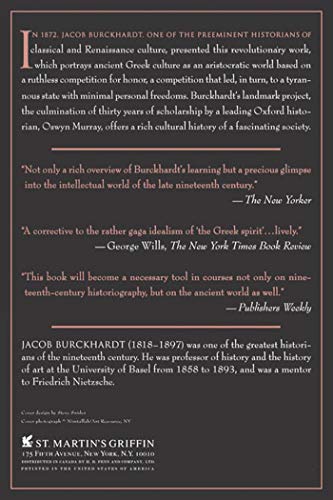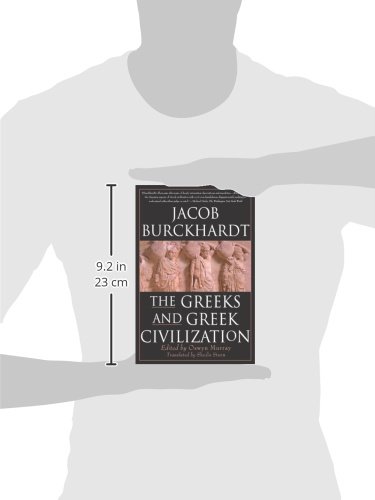Customer Services
Customer Support

Desert Online General Trading LLC
Warehouse # 7, 4th Street, Umm Ramool, Dubai, 30183, Dubai
Copyright © 2025 Desertcart Holdings Limited




Full description not available
S**M
Life Beyond the City-State
One of the constant criticisms of Burckhardt's History of Greek Culture was that it repeated what was in this book.This book is more specialized.The History of Greek Culture was from the point of view of not just the poetry and plays,but from the point of view of the composers and performers.This is from the point of view from the audience.This is a major difference.Starting with the political system,which happens to be a form of communism;how did the population that survived the pogroms enjoy plays,poetry,and music in the audience?The History of Greek Culture concentrates on the form of these arts.The audience would gather into the amphitheater in all their glory.This would include their entourage as well as their clothing.They were there not just to be entertained,but they were there to be seen too.
A**G
Classical scholarship
Impeccable scholarship. Exquisite writing. This kind of mastery is, like ancient Greek civilization, destined for the Endangered Species list. For now, we have Burckhardt's gems to appreciate and extoll.
T**E
Possibly the best thing ever written about the Greeks
Just in reference to some of the things other reviewers have said: books like this are only out of date to the extent that recent actual archeological or scientific study favors conclusions contrary to their own. A lot of what's in this book is bolstered up by such later discoveries - comments on new comedy entirely in line with later excavated works by Menander for instance. We view the Greeks today with an early 21st Century perspective. The difference between the amount of information available to Burckhardt and the amount of information available to us upon which to present the kind of global account that Burckhardt is presenting is negligible. Certain important aspects of Greek life that Burckhardt emphasizes would be overlooked today; not because the modern sciences of philology or archeology have proven them wrong, but because they are out of sync with the academic demands of the time, many of which are mere fashion. If I'm to choose between receiving a general account of Greek culture from a run-of-the-mill baby-boomer academic, and receiving one from one of the preeminent scholars of the 19th century, venerated by Nietzsche, I'd choose Burckhardt. The book is astonishing in ways that couldn't be replicated today.
D**O
Five Stars
great
M**L
I recommend this book
The topic is too important to be ignored. I recommend this book. I liked the quick service and fast delivery by this store. Thanks.
B**S
A masterpiece of writing
Jacob Burckhardt wrote his masterful work, “The Greeks and Greek Civilization,” in the late 19th Century. It was a time when the study of cultural history, as opposed to political history, was coming into vogue. He downplays political history so much that he minimizes the importance of the giants of Greece history like Pericles and Alexander the Great. Instead, he gives importance to as to what was responsible for the greatness of classical Greece. Here, Burckhardt gives answers. He devotes 53 pages to his chapter, “The Agonal Age”. “Agon,” he maintains is a “motive power known to no other people.” It enabled the Greeks to push themselves harder than anyone else. Showing us the depths of their belief in mythology, the meaning of the city to Greeks, and the overall characteristics of Hellenic life, Burchkardt delves into the very soul of Greek thought and practice. He gives reasons why we must study ancient history. “In our kinship with classical antiquity, as in our differences from it, we must endlessly be taking stock of what we owe to it.”Bruce Stores is author of NILO & DEMETRIUS, Brothers in Classical Greece.”
R**D
sprawling, deep, and quirky interpretation based on myth and literature
This is at times a great, often frustrating, rich yet also dry, longitudinal interpretation of the Greek cultural legacy by one of the great minds in history (of the 19C). However, it isn't for everyone, and particularly not for beginners who want an introduction to the basics. It assumes that the reader - actually the listeners as this is taken from a series of lectures and was not intended for publication as a book - had had a classical education as was traditional at the time, that is, studying the languages and literature from an early age all the way through high school. That was a time when not only the most famous characters and myths were known as a common vocabulary, but were referred regularly to in popular culture (poems, operas, paintings, etc.). The reader of the 20C might know who Perikles, Socrates, and Solon were, but it would take a classics major or serious history buff to know the names Alcibiades, Cleon, Lykurgus or hunderds of others referred to regularly. This text more or less assumes the reader has this culture and offers a subtle and deeply satisfying interpretation of how they fit into a wonderfully coherent culture that forms the basis of much of modern European culture, but it does not retell the essential stories.That being said, if the reader is acquainted with the history and culture, the book is a spectacular overview from the mythic era (about the end of the Bronze Age, of 11 C BCE) to the Hellenism of Alexander the Great, or the 4C BCE. I read it as a review or point of view on a culture I have long studied and at its best it is a great joy.Burckhardt begins with an analysis of how myth may have reflected the basis of prehistorical movements of Greek tribes and families. Thus the Heraclids - sons of Hercules - were supposed to have conquered the Pelopponese and so were ancestors of the Spartans and others. Then, as the culture consolidated itself to the 7 C BCE, Burckhardt explains such notions as the Polis, according to which the glory of the city was a collective responsibility of its inhabitants, leading to great city-states such as Athens, but scores of others as well. This led to the Agon competitions for glory in sport (e.g., the Olympian games) but also in generalist education as a way to seek glory for the Polis. This is pretty run of the mill stuff and takes up the first 150 pages of Burckhardt's text. It lost me many times and I was on the verge of quitting when he got to the classical age - the 5th C BCE - which is by far the best section in the book. Nonetheless, Burckhardt does advance a radical thesis - that the Greeks were not happy in democracy but extremely pessimistic - that went against the prevailing view of the 19C that viewed the Greeks as happy at a unique cultural and political moment.For the 5C BCE, the reader gets a detailed interpretation of Athens at the height of its glory, when Greece united to beat back the Persians, then Athens set up the Delphian League as an imperialist democracy that took advantage of its allies, and ended in the tragic war with Sparta. This period - the first with an extensive literature of use to historians - saw the birth of rationalist philosophy, tragic drama, objective history based on multiple sources, and the monumental architectural forms based on the rectangle and circle that dominated the medium until the 20C. It also saw fundamental experimentation in military and administrative regimes that led not only to Alexander the Great but also was studied by the Romans before their transmission to the West. There was, in my view, no greater flowering of culture in the history of mankind, with the possible exceptions of certain periods of the Chinese, Islamic, and Indian civilizations, though the latter did not succeed in creating the same linear sense of history that leads us in the West directly back to the Greeks.Underneath the achievements, Burckhardt uncovers the destructive impulses that underlay much of the creativity: the ruthless ambition, the breakdown of the norms of government and ethics, and the slaughter of rivals both within the Polis and between rivals city states. In this period, the ideals of the Polis, democracy, and the Agon were subverted and eventually destroyed, resulting in nostalgia for a "golden age" that was forever gone though preserved like a world under the microscope. It is a chilling picture, which led directly to the takeover by the Macedonians, who transmitted much of the culture without it creative vitality throughout the Mediterranean and beyond.I learned a great deal from this book, indeed I pictured the wholeness of the Greek cultural ark in a way I never had before. However, reading this is very challenging. The reader must persevere through many dry and obscure passages, with references that require one to have an encyclopedia at hand. Some of it is out of date - you get no archeology at all as it is entirely literary, hence slanted to the concerns expressed by the elite of that time and interpreted by 19C Swiss bourgeoisie. The reading experience is not helped by the turgid 50-page introduction by the editor, who places Burckhardt (the founder of Kulturgeschicte, where "ideas are in the air") in opposition to the exceedingly pedantic 19C historical style of knowing more and more about less and less.In spite of my caveats, I would recommend this book with enthusiasm.
R**
Super
Great book
Trustpilot
2 weeks ago
2 days ago